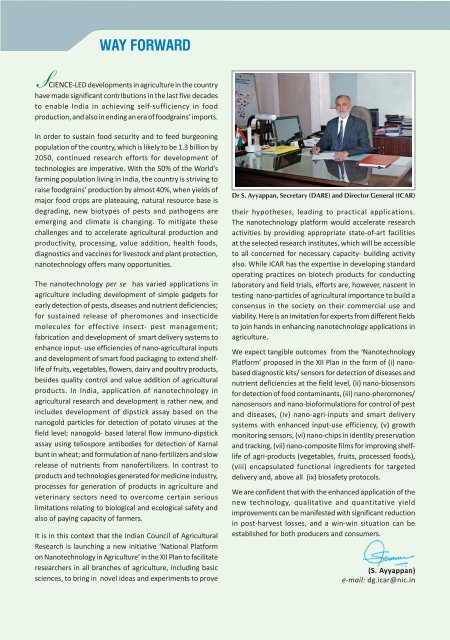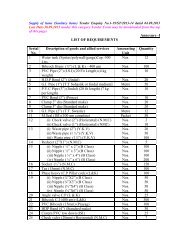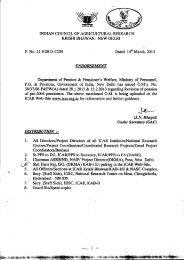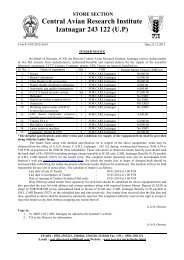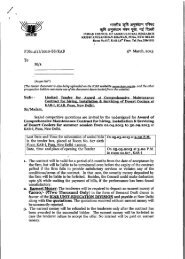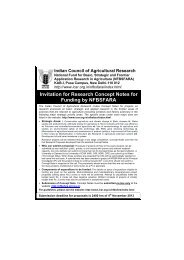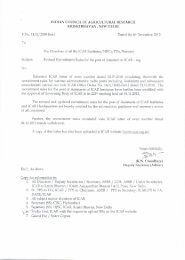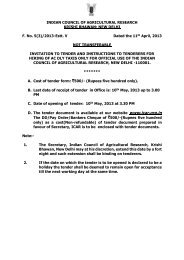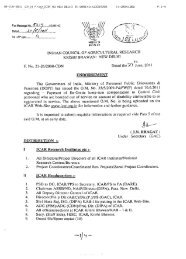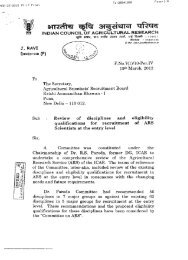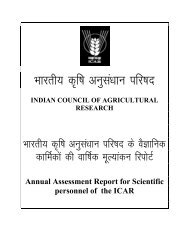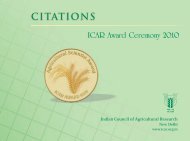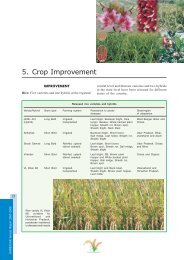Volume 18 no. 4 October- December 2012 - Indian Council of ...
Volume 18 no. 4 October- December 2012 - Indian Council of ...
Volume 18 no. 4 October- December 2012 - Indian Council of ...
Create successful ePaper yourself
Turn your PDF publications into a flip-book with our unique Google optimized e-Paper software.
WAY FORWARD<br />
SCIENCE-LED developments in agriculture in the country<br />
have made significant contributions in the last five decades<br />
to enable India in achieving self-sufficiency in food<br />
production, and also in ending an era <strong>of</strong> foodgrains’ imports.<br />
In order to sustain food security and to feed burgeoning<br />
population <strong>of</strong> the country, which is likely to be 1.3 billion by<br />
2050, continued research efforts for development <strong>of</strong><br />
tech<strong>no</strong>logies are imperative. With the 50% <strong>of</strong> the World’s<br />
farming population living in India, the country is striving to<br />
raise foodgrains’ production by almost 40%, when yields <strong>of</strong><br />
major food crops are plateauing, natural resource base is<br />
degrading, new biotypes <strong>of</strong> pests and pathogens are<br />
emerging and climate is changing. To mitigate these<br />
challenges and to accelerate agricultural production and<br />
productivity, processing, value addition, health foods,<br />
diag<strong>no</strong>stics and vaccines for livestock and plant protection,<br />
na<strong>no</strong>tech<strong>no</strong>logy <strong>of</strong>fers many opportunities.<br />
The na<strong>no</strong>tech<strong>no</strong>logy per se has varied applications in<br />
agriculture including development <strong>of</strong> simple gadgets for<br />
early detection <strong>of</strong> pests, diseases and nutrient deficiencies;<br />
for sustained release <strong>of</strong> pheromones and insecticide<br />
molecules for effective insect- pest management;<br />
fabrication and development <strong>of</strong> smart delivery systems to<br />
enhance input- use efficiencies <strong>of</strong> na<strong>no</strong>-agricultural inputs<br />
and development <strong>of</strong> smart food packaging to extend shelflife<br />
<strong>of</strong> fruits, vegetables, flowers, dairy and poultry products,<br />
besides quality control and value addition <strong>of</strong> agricultural<br />
products. In India, application <strong>of</strong> na<strong>no</strong>tech<strong>no</strong>logy in<br />
agricultural research and development is rather new, and<br />
includes development <strong>of</strong> dipstick assay based on the<br />
na<strong>no</strong>gold particles for detection <strong>of</strong> potato viruses at the<br />
field level; na<strong>no</strong>gold- based lateral flow immu<strong>no</strong>-dipstick<br />
assay using teliospore antibodies for detection <strong>of</strong> Karnal<br />
bunt in wheat; and formulation <strong>of</strong> na<strong>no</strong>-fertilizers and slow<br />
release <strong>of</strong> nutrients from na<strong>no</strong>fertilizers. In contrast to<br />
products and tech<strong>no</strong>logies generated for medicine industry,<br />
processes for generation <strong>of</strong> products in agriculture and<br />
veterinary sectors need to overcome certain serious<br />
limitations relating to biological and ecological safety and<br />
also <strong>of</strong> paying capacity <strong>of</strong> farmers.<br />
It is in this context that the <strong>Indian</strong> <strong>Council</strong> <strong>of</strong> Agricultural<br />
Research is launching a new initiative ‘National Platform<br />
on Na<strong>no</strong>tech<strong>no</strong>logy in Agriculture’ in the XII Plan to facilitate<br />
researchers in all branches <strong>of</strong> agriculture, including basic<br />
sciences, to bring in <strong>no</strong>vel ideas and experiments to prove<br />
Dr S. Ayyappan, Secretary (DARE) and Director General (ICAR)<br />
their hypotheses, leading to practical applications.<br />
The na<strong>no</strong>tech<strong>no</strong>logy platform would accelerate research<br />
activities by providing appropriate state-<strong>of</strong>-art facilities<br />
at the selected research institutes, which will be accessible<br />
to all concerned for necessary capacity- building activity<br />
also. While ICAR has the expertise in developing standard<br />
operating practices on biotech products for conducting<br />
laboratory and field trials, efforts are, however, nascent in<br />
testing na<strong>no</strong>-particles <strong>of</strong> agricultural importance to build a<br />
consensus in the society on their commercial use and<br />
viability. Here is an invitation for experts from different fields<br />
to join hands in enhancing na<strong>no</strong>tech<strong>no</strong>logy applications in<br />
agriculture.<br />
We expect tangible outcomes from the ‘Na<strong>no</strong>tech<strong>no</strong>logy<br />
Platform’ proposed in the XII Plan in the form <strong>of</strong> (i) na<strong>no</strong>based<br />
diag<strong>no</strong>stic kits/ sensors for detection <strong>of</strong> diseases and<br />
nutrient deficiencies at the field level, (ii) na<strong>no</strong>-biosensors<br />
for detection <strong>of</strong> food contaminants, (iii) na<strong>no</strong>-pheromones/<br />
na<strong>no</strong>sensors and na<strong>no</strong>-bi<strong>of</strong>ormulations for control <strong>of</strong> pest<br />
and diseases, (iv) na<strong>no</strong>-agri-inputs and smart delivery<br />
systems with enhanced input-use efficiency, (v) growth<br />
monitoring sensors, (vi) na<strong>no</strong>-chips in identity preservation<br />
and tracking, (vii) na<strong>no</strong>-composite films for improving shelflife<br />
<strong>of</strong> agri-products (vegetables, fruits, processed foods),<br />
(viii) encapsulated functional ingredients for targeted<br />
delivery and, above all (ix) biosafety protocols.<br />
We are confident that with the enhanced application <strong>of</strong> the<br />
new tech<strong>no</strong>logy, qualitative and quantitative yield<br />
improvements can be manifested with significant reduction<br />
in post-harvest losses, and a win-win situation can be<br />
established for both producers and consumers.<br />
(S. Ayyappan)<br />
e-mail: dg.icar@nic.in


